Angela Ackerman's Blog: Writers Helping Writers, page 171
November 26, 2012
Adapting Story Structure for Any Project
Well, November is quickly wrapping up and we appear to be careening headlong toward Christmas. But slow it down, people! Because today we're Stop #3 on Lydia Sharp's blog tour for her recent release of Twin Sense. Ange and I are both HUGE Save the Cat! fans, and we're super excited that Lydia's going to share some tips on how to use Blake Snyder's Beat Sheet to help with story structure.
*****
Ever since I discovered Save the Cat! by Blake Snyder back in 2009 (which was actually less of a discovery and more of a recommendation by the fabulous Therese Walsh), I’ve never approached my first drafts in the same way again. I used to be an all-out pantser, with only a vague idea of where to begin and where the story would end up on the final page, but no idea whatsoever of how to get there or what needed to happen through the middle.
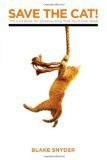 Then Blake Snyder’s Beat Sheet came into my life and everything made sense. Writing up a Beat Sheet is not the very first step of my story development process, but it does happen early on.
Then Blake Snyder’s Beat Sheet came into my life and everything made sense. Writing up a Beat Sheet is not the very first step of my story development process, but it does happen early on.
First, I get an idea for a concept and a specific main character to navigate the plot--this is where I hone my logline and 2-3 paragraph pitch. Then I write a possible opening scene, to get a feel for the main character’s voice. Then I create the Beat Sheet.
A Beat Sheet is not meant to be a strict outline. It’s more like a frame of guideposts that light your way from draft to draft. Here is my Beat Sheet for Twin Sense :
PROJECT TITLE: Twin Sense
GENRE: contemp YA; sub-genre: romantic comedy
WORD COUNT GOAL: 12,000
LOGLINE: Twin Sense is about a girl who must untangle herself from the love quadrangle she created with her boyfriend, her boyfriend’s twin brother, and her boyfriend’s twin brother’s ex-girlfriend.
START DATE: December 2011
FINISH BY: February 2012
Before I go any further I’d like to emphasize how important it is to have a word count goal before you start. This affects how you break down your Beat Sheet, which will in turn help you write a more focused first draft. Twin Sense is short, so I had very little room to develop one section before it was time to move on to the next. If not for the Beat Sheet I could have very easily gone astray between turning points, resulting in major revision woes on the second draft.
And since the Beat Sheet was meant for screenwriters, not fiction writers, you must calculate the word count milestone for every beat. This is how many words you should have written when you reach each major turning point. But remember this is just a guideline. There is plenty of room for flexibility, especially in a first draft. I also suggest giving yourself a deadline if this is a story not under contract with an editor-issued time frame. Deadlines have a way of motivating you.
Twin Sense has a total of 12,000 words, and there are 110 minutes in a Beat Sheet. Here is how that (roughly) translates:
Opening and Setup : 0 - 1300 words - inciting incident; set the tone - contemporary, teen romance, humor
Theme stated; all major players introduced
Catalyst : 1300 words - new element introduced that forces MC to make a choice
Debate : 1300 - 2700 words - MC unsure of which path to take; unsure of new relationship
Break Into Two : 2700 - 3300 words - MC makes the decision to avoid making a decision (haha)
B Story transition; running gag introduced
Promise of the Premise : 3300 - 6000 words - MC waffles between two love interests, not realizing the mess she’s creating until it’s too late
All minor players are introduced or referenced by now
Midpoint : 6000 words - MC realizes the mess she created; now the decision she was avoiding is even more difficult to make
The Big Squeeze : 6000 - 8000 words - stakes raised by outside forces; things the MC thought she knew for certain are now questioned
All Is Lost : 8000 words - an easy solution is clearly impossible; any solution seems impossible
Dark Night of the Soul : 8000 - 9300 words - MC reflects on her situation; seeks solution even if it means personal sacrifice
Break Into Three : 9300 words - MC decides to move forward despite any consequences. Everything the MC needs to reach the resolution at the climax has been introduced by now, even if she doesn’t realize this until the moment she needs it during the finale
Finale : 9300 - 12000 words - MC fights for what she wants; chaos ensues; story resolution
Closing Image: 12000 words - wrap-up; circle back to the beginning/emphasize theme
(Sorry I had to get really general in the second half to avoid giving away spoilers!)
Notice that each beat only requires a single sentence about what I planned to happen there. This is what gives my creative juices room to flow as I move through the first draft. If you get too detailed in this planning stage it doesn’t usually help much because you end up changing most of those details as you write in “story mode” rather than “brainstorming mode.”
For those of you who are novelists and tend to have trouble writing short fiction, you’re probably making cross-eyes at those numbers, I’m sure. In the average novel, the catalyst occurs right around the 10,000 word mark. In Twin Sense, 10,000 words is almost the entire story--the catalyst occurs less than 1500 words into it. This is why I believe writing short fiction is an excellent way to practice your brisk pacing skills.
Once I have this rough outline written, I reference it throughout the process of writing my first draft. I’m an obsessive word count checker, which may seem counter-productive, but it actually helps me finish my drafts more quickly because I don’t allow myself to run astray. That isn’t to say that I don’t write extra scenes or notes. I do all of that, and it helps tremendously with plot development, character development, and for brainstorming unique twists and turns. But all of that stays outside of the story document until I figure out how to use it.
After the first draft is complete and then major revisions are done, I tighten everything up to make sure it adheres to the story structure as closely as possible without feeling formulaic. If the average reader (not someone who studies the craft of writing) is able to “see” your structure, then your story isn’t ready yet. Blend and weave all the story elements in such a way that it feels like one, solid piece, instead of a bunch of little pieces all tossed together into a box labeled “story.”
It should flow naturally from point to point, never feel forced. Work as many drafts as necessary to make this happen. Beta readers are priceless at this stage.
After Twin Sense was accepted for publication, my editor suggested a lot of cuts (to help with pacing) and a few scenes were completely revised. This, of course, affected the overall structure, so the adjustments continued. I had to make sure my new changes didn’t mess up the flow or inadvertently shift a turning point to the wrong place.
In other words, revisions can create an imbalanced structure if you don’t go back and readjust. That is why you need to think about structure from the time you first think up a story idea all the way to your final edits before publication. It stays with you every step of the way, no matter what your story’s genre, type, or length.
So that’s my story structure process, but every writer has their own. Do you use a Beat Sheet? If so, how? If not, what do you use (if anything)?
Lydia Sharp is a novelist and short fiction author who grew up on the shores of Lake Erie. Then she got tired of finding sand in her clothes so she moved further inland, but she'll always call Ohio home. Laughing is her favorite pastime. Kissing is a close second. Lydia is also a regular contributor to the Write It Sideways blog and the award-winning Writer Unboxed blog. Her recent release, Twin Sense, is now available for purchase.
 As girlfriends of the Taylor twins, Layna and Sherri have only been friends by association. But when Sherri breaks up with Keith (for real this time), and Kevin gives Layna a promise ring (whoa, what?), Layna's whole world spins off balance. She avoids Kevin's unwelcome pressure to commit by spending more time with Sherri.
As girlfriends of the Taylor twins, Layna and Sherri have only been friends by association. But when Sherri breaks up with Keith (for real this time), and Kevin gives Layna a promise ring (whoa, what?), Layna's whole world spins off balance. She avoids Kevin's unwelcome pressure to commit by spending more time with Sherri.
Without the twins around, Layna and Sherri are tempted to go beyond friendship status. Then Keith tries to win Sherri back, and Kevin apologizes for rushing Layna. Now she's stuck inside a double-trouble love quadrangle that has her reaching for the consolation cheesecake. The only way to sort out this mess is to make an impossible choice—between the one she wants and the other one she wants—or she might end up with no one

*****
Ever since I discovered Save the Cat! by Blake Snyder back in 2009 (which was actually less of a discovery and more of a recommendation by the fabulous Therese Walsh), I’ve never approached my first drafts in the same way again. I used to be an all-out pantser, with only a vague idea of where to begin and where the story would end up on the final page, but no idea whatsoever of how to get there or what needed to happen through the middle.
 Then Blake Snyder’s Beat Sheet came into my life and everything made sense. Writing up a Beat Sheet is not the very first step of my story development process, but it does happen early on.
Then Blake Snyder’s Beat Sheet came into my life and everything made sense. Writing up a Beat Sheet is not the very first step of my story development process, but it does happen early on.First, I get an idea for a concept and a specific main character to navigate the plot--this is where I hone my logline and 2-3 paragraph pitch. Then I write a possible opening scene, to get a feel for the main character’s voice. Then I create the Beat Sheet.
A Beat Sheet is not meant to be a strict outline. It’s more like a frame of guideposts that light your way from draft to draft. Here is my Beat Sheet for Twin Sense :
PROJECT TITLE: Twin Sense
GENRE: contemp YA; sub-genre: romantic comedy
WORD COUNT GOAL: 12,000
LOGLINE: Twin Sense is about a girl who must untangle herself from the love quadrangle she created with her boyfriend, her boyfriend’s twin brother, and her boyfriend’s twin brother’s ex-girlfriend.
START DATE: December 2011
FINISH BY: February 2012
Before I go any further I’d like to emphasize how important it is to have a word count goal before you start. This affects how you break down your Beat Sheet, which will in turn help you write a more focused first draft. Twin Sense is short, so I had very little room to develop one section before it was time to move on to the next. If not for the Beat Sheet I could have very easily gone astray between turning points, resulting in major revision woes on the second draft.
And since the Beat Sheet was meant for screenwriters, not fiction writers, you must calculate the word count milestone for every beat. This is how many words you should have written when you reach each major turning point. But remember this is just a guideline. There is plenty of room for flexibility, especially in a first draft. I also suggest giving yourself a deadline if this is a story not under contract with an editor-issued time frame. Deadlines have a way of motivating you.
Twin Sense has a total of 12,000 words, and there are 110 minutes in a Beat Sheet. Here is how that (roughly) translates:
Opening and Setup : 0 - 1300 words - inciting incident; set the tone - contemporary, teen romance, humor
Theme stated; all major players introduced
Catalyst : 1300 words - new element introduced that forces MC to make a choice
Debate : 1300 - 2700 words - MC unsure of which path to take; unsure of new relationship
Break Into Two : 2700 - 3300 words - MC makes the decision to avoid making a decision (haha)
B Story transition; running gag introduced
Promise of the Premise : 3300 - 6000 words - MC waffles between two love interests, not realizing the mess she’s creating until it’s too late
All minor players are introduced or referenced by now
Midpoint : 6000 words - MC realizes the mess she created; now the decision she was avoiding is even more difficult to make
The Big Squeeze : 6000 - 8000 words - stakes raised by outside forces; things the MC thought she knew for certain are now questioned
All Is Lost : 8000 words - an easy solution is clearly impossible; any solution seems impossible
Dark Night of the Soul : 8000 - 9300 words - MC reflects on her situation; seeks solution even if it means personal sacrifice
Break Into Three : 9300 words - MC decides to move forward despite any consequences. Everything the MC needs to reach the resolution at the climax has been introduced by now, even if she doesn’t realize this until the moment she needs it during the finale
Finale : 9300 - 12000 words - MC fights for what she wants; chaos ensues; story resolution
Closing Image: 12000 words - wrap-up; circle back to the beginning/emphasize theme
(Sorry I had to get really general in the second half to avoid giving away spoilers!)
Notice that each beat only requires a single sentence about what I planned to happen there. This is what gives my creative juices room to flow as I move through the first draft. If you get too detailed in this planning stage it doesn’t usually help much because you end up changing most of those details as you write in “story mode” rather than “brainstorming mode.”
For those of you who are novelists and tend to have trouble writing short fiction, you’re probably making cross-eyes at those numbers, I’m sure. In the average novel, the catalyst occurs right around the 10,000 word mark. In Twin Sense, 10,000 words is almost the entire story--the catalyst occurs less than 1500 words into it. This is why I believe writing short fiction is an excellent way to practice your brisk pacing skills.
Once I have this rough outline written, I reference it throughout the process of writing my first draft. I’m an obsessive word count checker, which may seem counter-productive, but it actually helps me finish my drafts more quickly because I don’t allow myself to run astray. That isn’t to say that I don’t write extra scenes or notes. I do all of that, and it helps tremendously with plot development, character development, and for brainstorming unique twists and turns. But all of that stays outside of the story document until I figure out how to use it.
After the first draft is complete and then major revisions are done, I tighten everything up to make sure it adheres to the story structure as closely as possible without feeling formulaic. If the average reader (not someone who studies the craft of writing) is able to “see” your structure, then your story isn’t ready yet. Blend and weave all the story elements in such a way that it feels like one, solid piece, instead of a bunch of little pieces all tossed together into a box labeled “story.”
It should flow naturally from point to point, never feel forced. Work as many drafts as necessary to make this happen. Beta readers are priceless at this stage.
After Twin Sense was accepted for publication, my editor suggested a lot of cuts (to help with pacing) and a few scenes were completely revised. This, of course, affected the overall structure, so the adjustments continued. I had to make sure my new changes didn’t mess up the flow or inadvertently shift a turning point to the wrong place.
In other words, revisions can create an imbalanced structure if you don’t go back and readjust. That is why you need to think about structure from the time you first think up a story idea all the way to your final edits before publication. It stays with you every step of the way, no matter what your story’s genre, type, or length.
So that’s my story structure process, but every writer has their own. Do you use a Beat Sheet? If so, how? If not, what do you use (if anything)?
Lydia Sharp is a novelist and short fiction author who grew up on the shores of Lake Erie. Then she got tired of finding sand in her clothes so she moved further inland, but she'll always call Ohio home. Laughing is her favorite pastime. Kissing is a close second. Lydia is also a regular contributor to the Write It Sideways blog and the award-winning Writer Unboxed blog. Her recent release, Twin Sense, is now available for purchase.
 As girlfriends of the Taylor twins, Layna and Sherri have only been friends by association. But when Sherri breaks up with Keith (for real this time), and Kevin gives Layna a promise ring (whoa, what?), Layna's whole world spins off balance. She avoids Kevin's unwelcome pressure to commit by spending more time with Sherri.
As girlfriends of the Taylor twins, Layna and Sherri have only been friends by association. But when Sherri breaks up with Keith (for real this time), and Kevin gives Layna a promise ring (whoa, what?), Layna's whole world spins off balance. She avoids Kevin's unwelcome pressure to commit by spending more time with Sherri. Without the twins around, Layna and Sherri are tempted to go beyond friendship status. Then Keith tries to win Sherri back, and Kevin apologizes for rushing Layna. Now she's stuck inside a double-trouble love quadrangle that has her reaching for the consolation cheesecake. The only way to sort out this mess is to make an impossible choice—between the one she wants and the other one she wants—or she might end up with no one

Published on November 26, 2012 04:00
November 24, 2012
Physical Attributes Entry: Ears
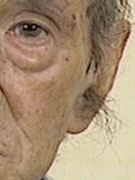
Funky Ear Hair picture:
courtesy of Wiki Commons
Physical description of a character can be difficult to convey—too much will slow the pace or feel 'list-like', while too little will not allow readers to form a clear mental image. If a reader cannot imagine what your character looks like, they may have trouble connecting with them on a personal level, or caring about their plight.
One way to balance the showing and telling of physical description is to showcase a few details that really help 'tell the story' about who your character is and what they've been through up to this point. Think about what makes them different and interesting. Can a unique feature, clothing choice or way they carry themselves help to hint at their personality? Also, consider how they move their body. Using movement will naturally show a character's physical characteristics, keep the pace flowing and help to convey their emotions.
EARS
Descriptors: big, small, dangly, flopping, large-lobed, cauliflower (wrestler's) ear, frostbitten, pink or red, protruding, pierced, Vulcan or elfin, deaf, hairy
Things Ears Do (and other words/phrases to describe those actions)
Hear: listen, eavesdrop, harken, overhear, catch, pick up
Key Emotions and Related Ear Gestures:
Ears can turn pink or red when someone is embarrassed or angry. They have the ability to become more sensitive to sounds when someone is afraid. People tend to play with their ears when they're nervous or restless by pulling, twisting, scratching, rubbing or bending them.
Simile and Metaphor Help:
I try flattening my ears, but it doesn't do any good. My head looks like a trophy cup.
He had foggy eyes and melted candle wax ears and scars that puckered his face.
Clichés to Avoid : Dumbo ears, someone who is "all ears", a talkative person "bending" someone's ear
HINT: When describing any part of the body, try to use cues that show the reader more than just a physical description. Make your descriptions do double duty. Example:
The cats wailed and howled and caterwauled, and all during the eerie duet they were moving closer to one another with their fangs bared and their ears laid back.
Nose to nose, Socks found Old Taylor a terrifying sight with his torn ear and his fur standing out on his great black jowls. But Socks did not back down. (Socks, by Beverly Cleary)
BONUS TIP: The Colors, Textures & Shapes Thesaurus in our sidebar might help you find a fresh take on some of the descriptors listed above!

Published on November 24, 2012 01:00
November 22, 2012
NANOWRIMO? I Don't Think So!
Well, we're staring down another week of NaNoWriMo, and another strange sighting of Angela. Like you, I've been exposed to some weird stuff this November, but I have to say, this really does take the cake.
This week's picture and letter comes from J.H. Bográn at The Tale Weaver Blog. He happened to spot Angela...I think it's better if you read about it in his own words.
Angela still insists she's writing her Nano novel, by the way. I want to believe her, I do. But as each week passes, it grows more difficult to view her as anything but a NaNoWriMo fraud.
Please read on for more on this week's "Angela Sighting"...

Is it a Bug’s life?
Well, here I am, thinking that dear old Angela has gotten bitten by a bug. Not the lovebug like the one from that Jonas Brother’s song, but one more in tune with us writers. You know, a writing bug.
So, around mid October we hear she’s getting all ready to submerge for thirty days and embrace her itch. We stay away to give her enough room. We content with perusing her blog, knowing that Becca will take care of it.
But then…or should I write, but then!
First we hear this funny report about how she’s dancing her way into the heart of a publisher, or agent, or whathaveyou. Personally, I dismissed as Angela doing her homework. Research is an important part of a writer’s life, right?
Then a second report comes in, that Angela’s is actively seeking to bring Elvis back! A good cause, I’m sure. Heck, I have more than one album from The King. Regardless of the cause, I wasn’t buying because I know the somewhat outer limits writers have gone in the name of research.
Last week I learned Angela had modified her diet. She’s into eating brains now. Good for her. Brains are high on protein. The question arose again, but I held firm. I chose to believe Angela was doing NaNoWriMo instead of these so-called sightings. I chose to think those people who claimed to have seen Angela were flukes, weirdos, people who had confused Angela for somebody else. I dismissed them as quick as I dismiss the UFO sighting reports.
That changed this week. Something’s bugging me. I came across this picture:

Original by Ed Schipul @ Wikimedia Commons
I am still not sure what the deal is. It looks like a stage adaptation of Disney’s A Bug’s Life or maybe Starship Troopers. Are we to understand that Angela’s bug was in fact an acting bug and not a writing one?
Honestly, it’s hard to keep up with Angela these days. It feels like we´re playing “Where in the World is Carmen San Diego.” Except the frustrating part that she should be home, writing. So Becca, I’m counting on you to give Angela a little message for me: Bug off, Angela!
So there you have it, folks. Is it official? Has Angela gone a little buggy? Or could there be some logical explanation for her sudden love for gold spandex? If you need more details on this latest encounter, you can usually find J. H. on Twitter or Facebook. And as always, I would love your thoughts on this, so please TAKE THE POLL...
Is this a case of beetle-brain, or simply that...

This week's picture and letter comes from J.H. Bográn at The Tale Weaver Blog. He happened to spot Angela...I think it's better if you read about it in his own words.
Angela still insists she's writing her Nano novel, by the way. I want to believe her, I do. But as each week passes, it grows more difficult to view her as anything but a NaNoWriMo fraud.
Please read on for more on this week's "Angela Sighting"...

Is it a Bug’s life?
Well, here I am, thinking that dear old Angela has gotten bitten by a bug. Not the lovebug like the one from that Jonas Brother’s song, but one more in tune with us writers. You know, a writing bug.
So, around mid October we hear she’s getting all ready to submerge for thirty days and embrace her itch. We stay away to give her enough room. We content with perusing her blog, knowing that Becca will take care of it.
But then…or should I write, but then!
First we hear this funny report about how she’s dancing her way into the heart of a publisher, or agent, or whathaveyou. Personally, I dismissed as Angela doing her homework. Research is an important part of a writer’s life, right?
Then a second report comes in, that Angela’s is actively seeking to bring Elvis back! A good cause, I’m sure. Heck, I have more than one album from The King. Regardless of the cause, I wasn’t buying because I know the somewhat outer limits writers have gone in the name of research.
Last week I learned Angela had modified her diet. She’s into eating brains now. Good for her. Brains are high on protein. The question arose again, but I held firm. I chose to believe Angela was doing NaNoWriMo instead of these so-called sightings. I chose to think those people who claimed to have seen Angela were flukes, weirdos, people who had confused Angela for somebody else. I dismissed them as quick as I dismiss the UFO sighting reports.
That changed this week. Something’s bugging me. I came across this picture:

Original by Ed Schipul @ Wikimedia Commons
I am still not sure what the deal is. It looks like a stage adaptation of Disney’s A Bug’s Life or maybe Starship Troopers. Are we to understand that Angela’s bug was in fact an acting bug and not a writing one?
Honestly, it’s hard to keep up with Angela these days. It feels like we´re playing “Where in the World is Carmen San Diego.” Except the frustrating part that she should be home, writing. So Becca, I’m counting on you to give Angela a little message for me: Bug off, Angela!
So there you have it, folks. Is it official? Has Angela gone a little buggy? Or could there be some logical explanation for her sudden love for gold spandex? If you need more details on this latest encounter, you can usually find J. H. on Twitter or Facebook. And as always, I would love your thoughts on this, so please TAKE THE POLL...
Is this a case of beetle-brain, or simply that...

Published on November 22, 2012 03:30
November 20, 2012
Increasing Your Book's Momentum, by Editor Laura Carlson

Happy Monday, people! I'm off to Disney with the fam. Because, you know, hosting 14 people for Thanksgiving at my place on Thursday AND celebrating my son's birthday on Friday just wasn't enough excitement for the week. I know, the timing isn't great, especially with all the CRAZY photographic evidence rumors circulating about Angela and what she's really up to this month. But never fear. I've got it covered. I brought in Laura Carlson to babysit everyone and give us a run-down on Momentum in our stories. Please give her a warm welcome and check out her blog, Between the Lines: Edits and Everything Else, where she's offering an awesome Holiday Giveaway: a FREE MANUSCRIPT CRITIQUE. Check out the details here.
Momentum: Getting Your Story up and Running
Because many of you are currently writing or editing manuscripts, I wanted to discuss an aspect of your book that you may not be concentrating on: momentum. Perhaps you’ve had someone read your book and tell you it was a bit slow. Once you managed to get past the devastating blow to your pride, you told them that they just needed to keep reading; they’d get to it soon enough. Right?
Wrong.
We live in a world where we get upset if a webpage does not load within ten seconds. We have social networks to update our statuses instantly, and we can access our global village from any place in the world. We are not patient.
Perhaps a few decades ago this was different, but since the Internet, the world’s collective attention span has atrophied. Writers cannot expect their readers to patiently wait for their book to start. No, you must begin your story with a bang or chance losing reader interest.
So today I will discuss what momentum is, where it is important, what slows down and speeds up a book’s momentum, how to identify areas of fast and slow momentum, and ultimately, how you can fix these problems.
What is “Momentum”?
I define momentum as the aspects of your book that generate reader excitement. Throughout a story the momentum fluctuates, but the most momentum occurs in areas of high tension and exciting conflict. These are areas where readers cannot set aside the book—they must find out what happens.
Where in the Book is Momentum Important?
Technically, momentum is important everywhere in your story, but there are a few key places where momentum is absolutely vital.
Hands down the most important area is the very beginning of your book. Why? Readers often read the first few pages of a book before committing to it. And because huge booksellers like Amazon allow readers to preview the first few pages of a book for free, many times committing to a book is synonymous to buying it. The stakes are high; if you cannot pique your readers’ interest here, then you risk losing readers, and ultimately, money.
I cannot speak for agents and editors, but my guess is that they are usually also looking for books with strong beginnings. If the book does not begin with a bang, then they’ll pass. After all, they’re investing in you. They want to reduce their risk by making sure your product sells instantly. I cannot stress enough how important it is to hook readers in these pages.
Another area where momentum is important is the end of each chapter. This is so well known that we have a name for it: “cliffhangers.” Chapters mark convenient stopping points for the reader, but if you can end a chapter with a cliffhanger, chances are they won’t be able to put the book down.
What Increases and Decreases the Momentum?
When editing your own book, it’s difficult to gauge where the momentum picks up and slows down. This is one of those pesky blind spots a great many writers have. However, below are some general rules that can help you discern where the momentum of your book is slow and where it is fast.
Things that Decrease Momentum:
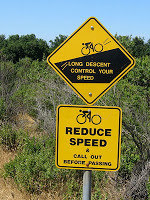
Courtesy of Wikimedia Commons
Thoughts
Long-winded monologues will scare off interested readers. Anywhere in your book where these occur you should seriously consider thinning them out. However, at the beginning of your book, these should occur in clusters of a few sentences at most. Anything more and the reader might fear that this is the tone of the book and quickly abandon it.
Description
Perhaps the most tempting and most lethal way to begin a story is to include a lot of description. It’s a quick kiss of death for books because most industry insiders consider lengthy descriptions to be a sign of an amateur writer.
It’s also a waste of your time because most readers are more impressed by plot twists and character development than they are your description of a pretty sunset. Every person has his or her own idea of what a beautiful sunset looks like. You’ll save face and a lot of time if you give readers only enough description for them to fill in with their own ideas.
Boring Scenes
This is a hard reality to swallow. Most writers enjoy much of what they write, so they often believe that every scene is exciting in some way. Please take a step back and look closely at your beginning scenes. If you are introducing Ma and Pa’s little farm, and a warm conversation your main character has with them, this is boring. Readers thrive on conflict. Inserting conflict in place of cooperation will do wonders for your book’s momentum.
Things that Increase Momentum:
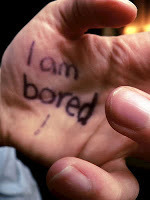
Courtesy of Wikimedia Commons
Exciting Scenes
In opposition to boring scenes, exciting scenes jumpstart a book’s momentum. Exciting scenes are not necessarily shootouts, but they do involve conflict and/or intrigue. These are especially great at the beginning of your book because they can conveniently introduce the book’s main conflict, and they pique reader interest.
Exciting scenes are also great fodder for cliffhangers for the same reason—they introduce conflict and intrigue. Readers are curious; if a scene ends uncertainly, or poses a question that requires an answer, the reader will want to read on. Some of the best books exploit this chapter after chapter. I’m sure you know the type of book I’m talking about; these are the books that require us to stay up late to finish.
Dialogue
Where description can lose reader interest, dialogue often increases reader interest. This is because when there is dialogue, things are happening; events are unfolding. The character is sleuthing, asking questions, confronting the antagonist, discussing the problem, and deciding on solutions. When paired with conflict and exciting scenes, dialogue can be an incredibly powerful tool used to reel readers in.
How to Identify where the Momentum is Slow
Take a look at the length of your paragraphs. Are they thin, or full of information? It might surprise you, but usually smaller paragraphs indicate more momentum because events are unfolding so quickly the main character does not have time to stop and describe or think deeply about a problem.
How to fix Momentum?
Ideally, you want to begin your story at the moment there is one. Don’t wait fifty pages for your story to begin. Start immediately. This means that you’ll want to insert dialogue and exciting scenes as soon as possible. Save the lengthy explanations and description for later. Remember, readers like conflict and questions. Start here and they won’t be disappointed.
The Caveat
While momentum is important, you must not completely remove thoughts and description. During exciting scenes, it’s important to include some details and some of the main character’s thoughts. After all, the latter is considered voice, and lots of readers like characters with voice. In addition, once an exciting scene is finished, readers want to know how the main character feels about the new developments in the story. Ideally you want a balance between thoughts, description, dialogue and action.
Conclusion
Momentum is vital to increasing readership and ultimately marketing your book. It is most important at the beginning of your manuscript and at the end of each chapter. Thoughts, description, and boring scenes can slow down a book’s momentum, while dialogue and exciting scenes can speed it up. You can identify areas of fast and slow momentum by looking at the paragraph length. But remember, while thoughts and description can slow down a book’s momentum, they are also necessary. If you can increase your book’s overall momentum, you’ll likely increase your readers’ excitement—and excitement is crucial in this industry.
Happy writing!

Published on November 20, 2012 04:00
November 19, 2012
6-1/2 Things I Learned from NaNoWriMo
For many of you, NaNoWriMo is in full swing. Some of you are proud of your progress. Some of you would like to wipe out your hard drive to get rid of every shred of evidence. Despite being a huge fan, I haven't done NaNo, but I can imagine that around this point, roughly 2/3rds of the way through, fatigue has set in. And maybe disgust. And possibly hypertension and a small aneurism.

Never fear, NaNo'ers! I've invited the most excellent Donna Gephart to share some wisdom and do a little pom-pom shaking. Hopefully, reading about her NaNo success story will give you that second (or third, or fifteenth) wind that will catapult you into December and NaNo success!
In 2009, desperate to emerge from my slump and write my third book, I discovered NaNoWriMo and signed up.
Two days before the November 1st start, I brainstormed ideas for two hours. At one hour and fifty-nine minutes, I scribbled these words: Olivia Bean, Trivia Queen.
The day before NaNoWriMo, I realized Olivia Bean was a trivia nut and wanted to get on the TV quiz show Jeopardy!
 Armed with trivia books and autobiographies of former Jeopardy! champs and lots of internet articles about Kids Week contestants, I plunged ahead. Each day in November, I struggled to figure out Olivia’s external and internal struggles and get them on the page in an exciting, coherent way.
Armed with trivia books and autobiographies of former Jeopardy! champs and lots of internet articles about Kids Week contestants, I plunged ahead. Each day in November, I struggled to figure out Olivia’s external and internal struggles and get them on the page in an exciting, coherent way.


To keep myself accountable, I blogged about the experience daily, including my word counts and a fun trivia question. (Nothing like public humiliation to keep you on track with your writing goals!) My first blog post is here.
Despite a mid-month trip to California to attend our nephew’s bar mitzvah, I finished Olivia Bean, Trivia Queen in 29 days. My agent likes me to point out that revisions took months. They did.
Olivia sold in February of 2010 to Delacorte Press/Random House and went on to receive excellent reviews, including a starred Kirkus review. I was thrilled when Jeopardy! champ Ken Jennings told me his son loved the book, and Ken wrote a blurb for the back cover. I’ve even received fan mail from kids who were actually on Kids Week on Jeopardy!
All that from a novel I wrote in less than a month.
So, here are 6-1/2 things I learned about writing a novel in a month . . .
1. Hard work is good medicine. Not writing, false starts and "wasted" days made me feel crazy. Working hard every day on this novel made me feel decidedly less crazy.
2. Know when to say "No" but also when to say "Yes." Writing should be your priority over watching TV, diddling around on Facebook and organizing your Chia pet collection. But family, friends and your health trump writing.
3. Don't beat yourself up over unproductive days. Your brain might be doing important behind-the-scenes work. My "unproductive" days were often followed by fat page counts.
4. Don't forge ahead blindly. NaNoWriMo suggests you keep writing and not go back over what you've already written. Not me. I needed to go back down my writing trail sometimes to make sure I hadn't diverged from the path I'd created. The important thing to remember is don't linger too long on those back pages; forge ahead!
5. You can accomplish pretty lofty goals one day (page) at a time. What's your lofty goal?
6. A person can write a salable novel in a month. There is a list of writers who sold their NaNoWriMo novels, including Sara Gruen who wrote Water for Elephants , which landed on the New York Times Bestseller list. I was determined not just to write a novel in a month, but to make it to that list of writers who sold their NaNoWriMo novels.
, which landed on the New York Times Bestseller list. I was determined not just to write a novel in a month, but to make it to that list of writers who sold their NaNoWriMo novels.
6 1/2. Say thank you. NaNoWriMo came at the exact time I needed to sit down, shut up and write my next novel. What a valuable tool. I've sent them a donation. I also sent a donation to 826 Valencia because I love what they do to foster and encourage young writers.
So, don't give up! Keep at it! And if you do decide to step back and actually breathe this month, don't worry. There's always next November.
Donna Gephart is working on her next novel. It’s taken a little longer than a month to develop. Ahem, three years. But she’s almost done . . . and is tackling NaNoWriMo again this year, along with her 18-year-old son. If you’re serious about writing well and quickly, get a copy of Rochelle Melander’s Write-A-Thon: Write Your Book in 26 Days (and live to tell about it) . It’s an excellent resource. To learn more about Donna’s books and presentations and view a funny singing hamster video, visit http://www.donnagephart.com.
. It’s an excellent resource. To learn more about Donna’s books and presentations and view a funny singing hamster video, visit http://www.donnagephart.com.


Never fear, NaNo'ers! I've invited the most excellent Donna Gephart to share some wisdom and do a little pom-pom shaking. Hopefully, reading about her NaNo success story will give you that second (or third, or fifteenth) wind that will catapult you into December and NaNo success!
In 2009, desperate to emerge from my slump and write my third book, I discovered NaNoWriMo and signed up.
Two days before the November 1st start, I brainstormed ideas for two hours. At one hour and fifty-nine minutes, I scribbled these words: Olivia Bean, Trivia Queen.
The day before NaNoWriMo, I realized Olivia Bean was a trivia nut and wanted to get on the TV quiz show Jeopardy!
 Armed with trivia books and autobiographies of former Jeopardy! champs and lots of internet articles about Kids Week contestants, I plunged ahead. Each day in November, I struggled to figure out Olivia’s external and internal struggles and get them on the page in an exciting, coherent way.
Armed with trivia books and autobiographies of former Jeopardy! champs and lots of internet articles about Kids Week contestants, I plunged ahead. Each day in November, I struggled to figure out Olivia’s external and internal struggles and get them on the page in an exciting, coherent way.

To keep myself accountable, I blogged about the experience daily, including my word counts and a fun trivia question. (Nothing like public humiliation to keep you on track with your writing goals!) My first blog post is here.
Despite a mid-month trip to California to attend our nephew’s bar mitzvah, I finished Olivia Bean, Trivia Queen in 29 days. My agent likes me to point out that revisions took months. They did.
Olivia sold in February of 2010 to Delacorte Press/Random House and went on to receive excellent reviews, including a starred Kirkus review. I was thrilled when Jeopardy! champ Ken Jennings told me his son loved the book, and Ken wrote a blurb for the back cover. I’ve even received fan mail from kids who were actually on Kids Week on Jeopardy!
All that from a novel I wrote in less than a month.
So, here are 6-1/2 things I learned about writing a novel in a month . . .
1. Hard work is good medicine. Not writing, false starts and "wasted" days made me feel crazy. Working hard every day on this novel made me feel decidedly less crazy.
2. Know when to say "No" but also when to say "Yes." Writing should be your priority over watching TV, diddling around on Facebook and organizing your Chia pet collection. But family, friends and your health trump writing.
3. Don't beat yourself up over unproductive days. Your brain might be doing important behind-the-scenes work. My "unproductive" days were often followed by fat page counts.
4. Don't forge ahead blindly. NaNoWriMo suggests you keep writing and not go back over what you've already written. Not me. I needed to go back down my writing trail sometimes to make sure I hadn't diverged from the path I'd created. The important thing to remember is don't linger too long on those back pages; forge ahead!
5. You can accomplish pretty lofty goals one day (page) at a time. What's your lofty goal?
6. A person can write a salable novel in a month. There is a list of writers who sold their NaNoWriMo novels, including Sara Gruen who wrote Water for Elephants
 , which landed on the New York Times Bestseller list. I was determined not just to write a novel in a month, but to make it to that list of writers who sold their NaNoWriMo novels.
, which landed on the New York Times Bestseller list. I was determined not just to write a novel in a month, but to make it to that list of writers who sold their NaNoWriMo novels.6 1/2. Say thank you. NaNoWriMo came at the exact time I needed to sit down, shut up and write my next novel. What a valuable tool. I've sent them a donation. I also sent a donation to 826 Valencia because I love what they do to foster and encourage young writers.
So, don't give up! Keep at it! And if you do decide to step back and actually breathe this month, don't worry. There's always next November.
Donna Gephart is working on her next novel. It’s taken a little longer than a month to develop. Ahem, three years. But she’s almost done . . . and is tackling NaNoWriMo again this year, along with her 18-year-old son. If you’re serious about writing well and quickly, get a copy of Rochelle Melander’s Write-A-Thon: Write Your Book in 26 Days (and live to tell about it)
 . It’s an excellent resource. To learn more about Donna’s books and presentations and view a funny singing hamster video, visit http://www.donnagephart.com.
. It’s an excellent resource. To learn more about Donna’s books and presentations and view a funny singing hamster video, visit http://www.donnagephart.com.
Published on November 19, 2012 04:00
November 17, 2012
Physical Attributes Thesaurus Entry: Arms
Before we get into today's entry, congrats go to Sandy Fry; Janel Gradowski & Jessica S. who have all won themselves and their friend a 250 word critique in our World Kindness Day Giveaway! Thanks everyone for entering and hurray for all the kindness you do for others!
And also, a reminder: for you NaNoWriMo'ers out there, Ange and I are giving away 10 digital copies ofThe Emotion Thesaurus: A Writer's Guide to Character Expression to participants and winners. More info can be found here, or just skip right to the entry form :).
And now, on to today's Physical Attributes Entry:
ARMS

Physical description of a character can be difficult to convey—too much will slow the pace or feel 'list-like', while too little will not allow readers to form a clear mental image. If a reader cannot imagine what your character looks like, they may have trouble connecting with them on a personal level, or caring about their plight.
One way to balance the showing and telling of physical description is to showcase a few details that really help 'tell the story' about who your character is and what they've been through up to this point. Think about what makes them different and interesting. Can a unique feature, clothing choice or way they carry themselves help to hint at their personality? Also, consider how they move their body. Using movement will naturally show a character's physical characteristics, keep the pace flowing and help to convey their emotions.
Descriptors: skinny, plump, dimpled, ropy, wiry, sinewy, muscled, tanned, hairy, strong, weak, bony, loving, sweaty, too-long, farmer-tanned, flabby, tattooed, broken
Things Arms Do (and other words/phrases to describe those actions)
Carry: lift, heft, hoist, lug, shift, take, tote, move
Hug: embrace, squeeze, enfold, hold, clasp, cuddle, snuggle, clamp, clinch, clutch, grasp, grip, seize, snatch
Key Emotions and Related Arm Gestures:
Excitement: flap, wave, pump, embrace, flail, gesticulate wildly
Anger: stiffen, harden, cross
Simile and Metaphor Help:
His arms hung too long, like they were made of silly putty that someone had stretched too far.
Yesterday's workout turned my arms to wood: they were hard and tight and no longer hinged in the middle.
Clichés to Avoid : gorilla arms, arms like tree trunks or branches, toothpick arms
HINT: When describing any part of the body, try to use cues that show the reader more than just a physical description. Make your descriptions do double duty. Example: Stephen's arms snaked around me and I tried not to stiffen. A hug should be a loving gesture, but with Stephen, it felt like two ropes tightening around me, binding me to him.
BONUS TIP: The Colors, Textures & Shapes Thesaurus in our sidebar might help you find a fresh take on some of the descriptors listed above!


And also, a reminder: for you NaNoWriMo'ers out there, Ange and I are giving away 10 digital copies ofThe Emotion Thesaurus: A Writer's Guide to Character Expression to participants and winners. More info can be found here, or just skip right to the entry form :).
And now, on to today's Physical Attributes Entry:
ARMS

Physical description of a character can be difficult to convey—too much will slow the pace or feel 'list-like', while too little will not allow readers to form a clear mental image. If a reader cannot imagine what your character looks like, they may have trouble connecting with them on a personal level, or caring about their plight.
One way to balance the showing and telling of physical description is to showcase a few details that really help 'tell the story' about who your character is and what they've been through up to this point. Think about what makes them different and interesting. Can a unique feature, clothing choice or way they carry themselves help to hint at their personality? Also, consider how they move their body. Using movement will naturally show a character's physical characteristics, keep the pace flowing and help to convey their emotions.
Descriptors: skinny, plump, dimpled, ropy, wiry, sinewy, muscled, tanned, hairy, strong, weak, bony, loving, sweaty, too-long, farmer-tanned, flabby, tattooed, broken
Things Arms Do (and other words/phrases to describe those actions)
Carry: lift, heft, hoist, lug, shift, take, tote, move
Hug: embrace, squeeze, enfold, hold, clasp, cuddle, snuggle, clamp, clinch, clutch, grasp, grip, seize, snatch
Key Emotions and Related Arm Gestures:
Excitement: flap, wave, pump, embrace, flail, gesticulate wildly
Anger: stiffen, harden, cross
Simile and Metaphor Help:
His arms hung too long, like they were made of silly putty that someone had stretched too far.
Yesterday's workout turned my arms to wood: they were hard and tight and no longer hinged in the middle.
Clichés to Avoid : gorilla arms, arms like tree trunks or branches, toothpick arms
HINT: When describing any part of the body, try to use cues that show the reader more than just a physical description. Make your descriptions do double duty. Example: Stephen's arms snaked around me and I tried not to stiffen. A hug should be a loving gesture, but with Stephen, it felt like two ropes tightening around me, binding me to him.
BONUS TIP: The Colors, Textures & Shapes Thesaurus in our sidebar might help you find a fresh take on some of the descriptors listed above!

Published on November 17, 2012 00:30
November 9, 2012
Physical Attributes Thesaurus Entry: Eyes

Courtesy of ismellsheep, WANA Commons
Physical description of a character can be difficult to convey—too much will slow the pace or feel 'list-like', while too little will not allow readers to form a clear mental image. If a reader cannot imagine what your character looks like, they may have trouble connecting with them on a personal level, or caring about their plight.
One way to balance the showing and telling of physical description is to showcase a few details that really help 'tell the story' about who your character is and what they've been through up to this point. Think about what makes them different and interesting. Can a unique feature, clothing choice or way they carry themselves help to hint at their personality? Also, consider how they move their body. Using movement will naturally show a character's physical characteristics, keep the pace flowing and help to convey their emotions.
Eyes
Descriptors: shades of blue, brown, green, gray, and hazel; almond-shaped, round, big, piggish, squinty, narrowed, close-set, far apart, glassy, feverish, watery, pink-rimmed, bright, dull, dancing, sparkling, speckled, laughing, smoldering, vapid, empty, dead, blind, far-sighted, near-sighted, cloudy, milky, protuberant, deep-set, sunken, blackened, bloodshot, dazed, hard, cold, limpid, dry, scratchy, yellowed, jaundiced, sharp, intelligent, gentle, kind, monochromatic, lazy, icy
Things Eyes Do (and other words/phrases to describe those actions)
Look: see, watch, glance, gaze, glimpse, notice, observe, peek, stare, view, take in
Move: roll, shift, narrow, blink, bat, wink, close, open, widen, dilate, dart, follow
Cry: leak, tear up, fill, water, overflow, glisten, drip, pour
Key Emotions and Related Eye Gestures:
Sadness: cry, grow dull, close, tear up, lose focus, grow distant
Anger: narrow, sharpen, grow cold, harden, increase in intensity, snap or spark, glower, stare, glare
Joy: brighten, sparkle, tear up, laugh
Fear: widen, dilate, squeeze shut, jump, dart, stare, stop blinking, dry out
Simile and Metaphor Help:
Without my glasses, I was as blind and vulnerable as a just-born squirrel.
I met his gaze and wished I hadn't. His ball-bearing eyes were small and black and inhuman. If he blinked, they'd drop out of their sockets and bounce across the floor, and the loss wouldn't deter him in the least.
Clichés to Avoid : bedroom eyes; eyes that pierce or look through you; eyes being the window to the soul; doe eyes; eyes as big as saucers; eyes that shoot daggers; sunken eyes that make one's head look like a skull; blind as a bat
HINT: When describing any part of the body, try to use cues that show the reader more than just a physical description. Make your descriptions do double duty. Example: Principal Miller was short and squat with too-long arms. Between classes, he slouched into the hallway and watched us with his bulging eyes, waiting for someone to screw up so he could pounce. "Frog" was the obvious nickname, but he wasn't nearly so smart. We called him Slug.
BONUS TIP: The Colors, Textures & Shapes Thesaurus in our sidebar might help you find a fresh take on some of the descriptors listed above!

Published on November 09, 2012 23:30
November 8, 2012
Angela, a NANO Fraud? Another Strange Sighting
Holy cow, people. I thought perhaps last week's photo of Angela frolicking with a sexy man was just some strange occurrence--you know, like how people say that somewhere in the world, we all have a twin? After all, Angela told me she was taking the month of November to write by candlelight in some clandestine Nanowrimo cave and would be off the grid.

However, Nicōle Olea, YA writer & YALITCHAT Membership Ambassador sent me this email yesterday:
Dear Becca,
It’s no wonder that this news has been buried, what with a highly important election going on, The Twilight Saga: Breaking Dawn II about to be released any day now, and Kourtney Kardashian’s apparent love for Spanx.
However, I’ve got some epic world changing news. Elvis lives!
Yes, the King, who has allegedly been swinging his hips for the big Guy upstairs for well over thirty years now, has been popping up all over the place right here on planet earth! I have it on a very good authority-‐from a trustworthy news source that Elvis sang Love Me Tender to President Obama on the campaign trail.
What could be bigger proof that The King Lives than crooning to the President of the free world you ask? Our very own Angela was in his royal presence and she can attest that not only was he breathing he hadn’t aged at all. I’m thinking he must have gone all sparkly vampire and that whole dying thing was just a cover up. Though she won’t confirm nor deny this theory, how it could it possibly be wrong?
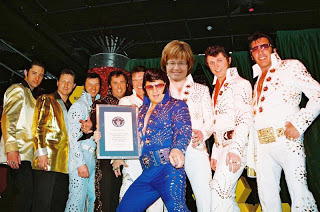
Original by Paul Smith @ Wikimedia Commons
I’m calling a Volturi cover up! What say you?
Love & big sparkly vampires who wear sparkly jumpsuits,
Nicōle
Again, I'm at a loss, Musers. Why is Angela here in this photo when she's supposed to writing a Middle Grade novel? And Holy Mountain Dew, why is she dressed as an ELVIS IMPERSONATOR? If you want more detail about this first person sighting, you can find Nicōle on her Blog and Twitter.
Help me figure this out! Take the POLL...
Angela isn't a fraud, is she? Perhaps in addition to doing NANOWRIMO,


However, Nicōle Olea, YA writer & YALITCHAT Membership Ambassador sent me this email yesterday:
Dear Becca,
It’s no wonder that this news has been buried, what with a highly important election going on, The Twilight Saga: Breaking Dawn II about to be released any day now, and Kourtney Kardashian’s apparent love for Spanx.
However, I’ve got some epic world changing news. Elvis lives!
Yes, the King, who has allegedly been swinging his hips for the big Guy upstairs for well over thirty years now, has been popping up all over the place right here on planet earth! I have it on a very good authority-‐from a trustworthy news source that Elvis sang Love Me Tender to President Obama on the campaign trail.
What could be bigger proof that The King Lives than crooning to the President of the free world you ask? Our very own Angela was in his royal presence and she can attest that not only was he breathing he hadn’t aged at all. I’m thinking he must have gone all sparkly vampire and that whole dying thing was just a cover up. Though she won’t confirm nor deny this theory, how it could it possibly be wrong?

Original by Paul Smith @ Wikimedia Commons
I’m calling a Volturi cover up! What say you?
Love & big sparkly vampires who wear sparkly jumpsuits,
Nicōle
Again, I'm at a loss, Musers. Why is Angela here in this photo when she's supposed to writing a Middle Grade novel? And Holy Mountain Dew, why is she dressed as an ELVIS IMPERSONATOR? If you want more detail about this first person sighting, you can find Nicōle on her Blog and Twitter.
Help me figure this out! Take the POLL...
Angela isn't a fraud, is she? Perhaps in addition to doing NANOWRIMO,

Published on November 08, 2012 03:30
November 3, 2012
Physical Thesaurus Attributes Entry: Chins and Jaws
Just a reminder for you NaNoWriMo'ers out there, that Ange and I are giving away 10 digital copies of The Emotional Thesaurus: A Writer's Guide to Character Expression to participants and winners. More info can be found here, or just skip right to the entry form :).
And now, on to today's Physical Attributes Entry:
CHINS & JAWS

Physical description of a character can be difficult to convey—too much will slow the pace or feel 'list-like', while too little will not allow readers to form a clear mental image. If a reader cannot imagine what your character looks like, they may have trouble connecting with them on a personal level, or caring about their plight.
One way to balance the showing and telling of physical description is to showcase a few details that really help 'tell the story' about who your character is and what they've been through up to this point. Think about what makes them different and interesting. Can a unique feature, clothing choice or way they carry themselves help to hint at their personality? Also, consider how they move their body. Using movement will naturally show a character's physical characteristics, keep the pace flowing and help to convey their emotions.
Descriptors:
Chins: double or triple, flabby, fleshy, undercut, recessed, pointy, sharp, cleft, dimpled, weak, strong, stubborn, stubbly, bearded, pimply, square, prominent
Jaws: clenched, wide, square, wired shut, clicking, creaking, sore, loose, jowly
Things Chins Do: jut, gesture, point, lift, lower, quiver, tremble
Things Jaws Do: drop open, clench, break, lock, slide back and forth, pop or crack,
Key Emotions and Related Gestures:
Anger: grinding teeth that result in a clenched jaw and "hard" chin; muscles jumping near the chin or jawline, tendons standing out; a chin that looks stronger or more prominent due to jutting out
Fear: chattering teeth due to a quivering jaw; clenching the teeth in an effort to keep the jaw still; dropping the jaw so as to breathe in more oxygen in preparation for what's to come
Sadness: a chin that quivers or trembles; a chin that drops to the chest; covering or rubbing the chin in an effort to hold back tears or keep others from noticing
Simile and Metaphor Help:
Megan's eyes flashed and she snapped her teeth shut. Her ever-pointy chin came at me like a missile.
Melvin towered over me, waiting for me to get up. I stayed where I was, working my jaw back and forth to test the damage. It creaked like a rusty barn door but seemed to be working.
Clichés to Avoid : elfin chins; glass jaws; a weak chin as a sign of a weasely, skeevy character
HINT: When describing any part of the body, try to use cues that show the reader more than just a physical description. Make your descriptions do double duty. Example: Hank leaned back in his chair, hands laced lightly over his torso, considering me. I couldn't look at his eyes, too scared to see his decision there, so I stared at his chin—dimpled and pale as a baby's bottom. But with the tiniest jerk, his goons would turn me into a bloody smear. I looked at the floor instead.
BONUS TIP: The Colors, Textures & Shapes Thesaurus in our sidebar might help you find a fresh take on some of the descriptors listed above!


And now, on to today's Physical Attributes Entry:
CHINS & JAWS

Physical description of a character can be difficult to convey—too much will slow the pace or feel 'list-like', while too little will not allow readers to form a clear mental image. If a reader cannot imagine what your character looks like, they may have trouble connecting with them on a personal level, or caring about their plight.
One way to balance the showing and telling of physical description is to showcase a few details that really help 'tell the story' about who your character is and what they've been through up to this point. Think about what makes them different and interesting. Can a unique feature, clothing choice or way they carry themselves help to hint at their personality? Also, consider how they move their body. Using movement will naturally show a character's physical characteristics, keep the pace flowing and help to convey their emotions.
Descriptors:
Chins: double or triple, flabby, fleshy, undercut, recessed, pointy, sharp, cleft, dimpled, weak, strong, stubborn, stubbly, bearded, pimply, square, prominent
Jaws: clenched, wide, square, wired shut, clicking, creaking, sore, loose, jowly
Things Chins Do: jut, gesture, point, lift, lower, quiver, tremble
Things Jaws Do: drop open, clench, break, lock, slide back and forth, pop or crack,
Key Emotions and Related Gestures:
Anger: grinding teeth that result in a clenched jaw and "hard" chin; muscles jumping near the chin or jawline, tendons standing out; a chin that looks stronger or more prominent due to jutting out
Fear: chattering teeth due to a quivering jaw; clenching the teeth in an effort to keep the jaw still; dropping the jaw so as to breathe in more oxygen in preparation for what's to come
Sadness: a chin that quivers or trembles; a chin that drops to the chest; covering or rubbing the chin in an effort to hold back tears or keep others from noticing
Simile and Metaphor Help:
Megan's eyes flashed and she snapped her teeth shut. Her ever-pointy chin came at me like a missile.
Melvin towered over me, waiting for me to get up. I stayed where I was, working my jaw back and forth to test the damage. It creaked like a rusty barn door but seemed to be working.
Clichés to Avoid : elfin chins; glass jaws; a weak chin as a sign of a weasely, skeevy character
HINT: When describing any part of the body, try to use cues that show the reader more than just a physical description. Make your descriptions do double duty. Example: Hank leaned back in his chair, hands laced lightly over his torso, considering me. I couldn't look at his eyes, too scared to see his decision there, so I stared at his chin—dimpled and pale as a baby's bottom. But with the tiniest jerk, his goons would turn me into a bloody smear. I looked at the floor instead.
BONUS TIP: The Colors, Textures & Shapes Thesaurus in our sidebar might help you find a fresh take on some of the descriptors listed above!

Published on November 03, 2012 00:30
November 1, 2012
FACT or FICTION: Is Angela REALLY Doing NaNoWriMo?
Something strange happened today and I'm turning to you guys for help. As you all know, Angela told us all she would be taking November off from the blog to participate in NaNoWriMo. A month of writing, no distractions, she said. A secluded getaway, just her and the keyboard, she said.
And well, that's what I thought she was doing.

But then I got a disturbing email addressed to Angela. It was from Jessica Bell, a respected blogger, songwriter, singer, author of String Bridge and well known personality in our writing community.
Because I'm handling all things blogging right now, I opened it. The contents were...most unAngela-like. If Jessica were not such a stand up person, I might have dismissed the letter and picture enclosed as some kind of hoax. But, knowing her as I do...I am at a loss as to what to believe.
After some serious deliberation, I'm posting the email here in hopes someone might have answers.
~*~*~
Dear Angela,
So
I kinda followed you this morning. And I brought my camera. You weren't
going to your writing cabin in the woods to tap away at your NaNo
project at all, were you? I mean, you lied to me. How could you? I
thought we were in this together?
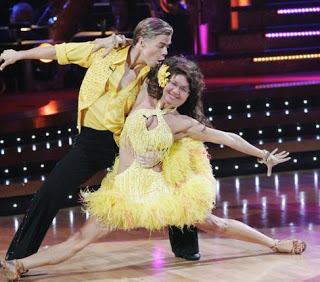
Original source ABC networ, DWTS
Unless...you are trying to fit in some quick research? Is your novel about extraterrestrial ballroom dancers, disguised as spunky blonds, that try to inhale human brain matter through aural orifices for experiments in cloning participants for Dancing with the Stars? If not, then I'm afraid I'm going to find it very hard to forgive you.
Is that what your book is about? *Ahem* Wow. Don't you think that's a bit out there? What kind of audience are you targeting? And what are you doing wearing that dress? I mean, unless you're planning on sitting on some Easter eggs, I would have thought your taste would be less ... yellow.
*Sigh*
Honestly, Angela, I'm disappointed. You'd better get in touch, stat. I need an explanation.
*Whispers* Oh, and um before you leave Mr Grease Lightnin' ... couldja score his um *cough* phone number *cough* for me?
~Jessica Bell
This must be a mistake. A misunderstanding. I mean, this couldn't REALLY be Angela, could it? She's supposed to be WRITING, glued to her computer, surviving off of Diet Dr. Pepper and leftover Halloween Candy. And dear god of Mountain Dew, wearing that dress? Please. The word isn't even in her vocabulary.
Okay. There MUST BE a logical reason for this picture that Jessica took. I'm interested in your thoughts, Musers, so please, TAKE THE POLL...
Angela would not lie to us, would she? I refuse to believe it! Therefore, in this picture, Angela...
Stay tuned, Musers. I will try and track her down.
Becca, OUT.

And well, that's what I thought she was doing.

But then I got a disturbing email addressed to Angela. It was from Jessica Bell, a respected blogger, songwriter, singer, author of String Bridge and well known personality in our writing community.
Because I'm handling all things blogging right now, I opened it. The contents were...most unAngela-like. If Jessica were not such a stand up person, I might have dismissed the letter and picture enclosed as some kind of hoax. But, knowing her as I do...I am at a loss as to what to believe.
After some serious deliberation, I'm posting the email here in hopes someone might have answers.
~*~*~
Dear Angela,
So
I kinda followed you this morning. And I brought my camera. You weren't
going to your writing cabin in the woods to tap away at your NaNo
project at all, were you? I mean, you lied to me. How could you? I
thought we were in this together?

Original source ABC networ, DWTS
Unless...you are trying to fit in some quick research? Is your novel about extraterrestrial ballroom dancers, disguised as spunky blonds, that try to inhale human brain matter through aural orifices for experiments in cloning participants for Dancing with the Stars? If not, then I'm afraid I'm going to find it very hard to forgive you.
Is that what your book is about? *Ahem* Wow. Don't you think that's a bit out there? What kind of audience are you targeting? And what are you doing wearing that dress? I mean, unless you're planning on sitting on some Easter eggs, I would have thought your taste would be less ... yellow.
*Sigh*
Honestly, Angela, I'm disappointed. You'd better get in touch, stat. I need an explanation.
*Whispers* Oh, and um before you leave Mr Grease Lightnin' ... couldja score his um *cough* phone number *cough* for me?
~Jessica Bell
This must be a mistake. A misunderstanding. I mean, this couldn't REALLY be Angela, could it? She's supposed to be WRITING, glued to her computer, surviving off of Diet Dr. Pepper and leftover Halloween Candy. And dear god of Mountain Dew, wearing that dress? Please. The word isn't even in her vocabulary.
Okay. There MUST BE a logical reason for this picture that Jessica took. I'm interested in your thoughts, Musers, so please, TAKE THE POLL...
Angela would not lie to us, would she? I refuse to believe it! Therefore, in this picture, Angela...
Stay tuned, Musers. I will try and track her down.
Becca, OUT.

Published on November 01, 2012 04:00
Writers Helping Writers
A place for writers to find support, helpful articles on writing craft, and an array of unique (and free!) writing tools you can't find elsewhere. We are known far and wide for our "Descriptive Thesau
A place for writers to find support, helpful articles on writing craft, and an array of unique (and free!) writing tools you can't find elsewhere. We are known far and wide for our "Descriptive Thesaurus Collections" which help authors create vivid imagery and sensory detail for their Settings, Characters (physical descriptions, emotions, skills & talents, etc.), Symbolism, Weather, and a whole bunch more. Stop in and say hello! :) http://writershelpingwriters.net/
...more
- Angela Ackerman's profile
- 1022 followers



